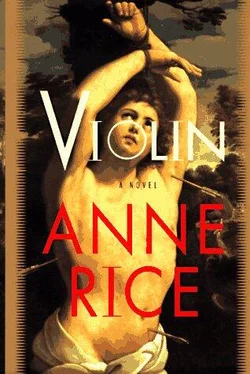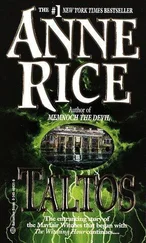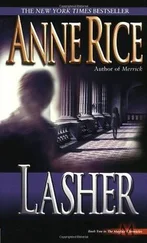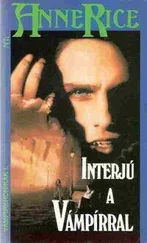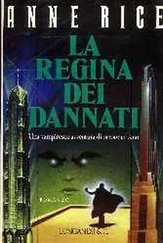Aren't they? You think she's here, your daughter?
"You tell me," I whispered. "She's not your ally, don't try to make me think that." I looked down and said it under my breath.
The others retreated. Martin saw them out.
"What do you want me to tell those damned reporters?"
"The truth," I said. "An old friend said that Lily had been reborn in this place." I turned again to the window and to the sweet thrust of the wind. "Oh, God, look at this sea, look. If Lily should come again, which I don't believe, why not in a place like this?
And do you hear their voices? Did I ever tell you about the Brazilian children she loved, who lived near us in those last years?"
"I met them," Martin said. "I was there. That family came from Sao Paulo. I won't have you upset by these things."
"Tell them we are looking for Lily but we don't seek to find her in any one human being, tell them something nice, tell them something that will fill up their municipal auditorium where we're to play. Go ahead."
"It's sold out," said Martin. "I don't want to leave you alone."
"I can't sleep till it gets dark. This is too much, too gorgeous, too perfectly shining.
Martin, are you tired?"
"No, not much. Why, what do you want to do?"
I thought. Rio.
"I want to go up in the rain forest," I said, "go up to the top of Corcovado. Look at the sky, how clear it is. Do we have time to do that before dark? I want to see Christ up there with his arms outstretched. I wish we could see Him from here."
Martin made the arrangements by phone.
"What a lovely thought," I said, "that Lily should come back alive and claim a long life in such a place as this." I closed my eyes and thought of her, my luminous one, bald and smiling, nestled in my arms, the little white collar of her checked dress turned up, so that in her steroid plumpness, her adorable roundness, we called her "Humpty."
I heard her laugh as clearly as if she were sitting astride Lev, who lay on his back on the cold grass of the rose garden in Oakland. Katrinka and Martin had taken us that day. We had that picture some where, perhaps it was with Lev-Lev lying on his back, and Lily sitting on his chest, her small round face beaming at the heavens. Katrinka had taken so many wonderful pictures.
Oh, God, stop it.
Laughter.
You can't make it sweet, no, you can't do that, it hurts too much and that you think, perhaps she hates you, that you let her die, perhaps your Mother too, and here you are in the land ofthe spirits.
"You take your strength from this place? You're a fool. The violin's mine. I'd burn it before I let you have it."
Martin spoke my name. No doubt behind me, he stood watching me talk to nothing, or maybe the wind hushed the words.
The car was ready. Antonio waited for us. We would drive to the tram. We had two bodyguards with us, both off-duty policemen hired for our safety, and the tram would take us up through the rain forest and we would have to walk the last steps to the foot of Christ at the very summit of the mountain.
"Are you sure," asked Martin, "that you're not too tired for this?"
"I'm excited. I love this air, this sea, everything around me . .
Yes, said Antonio, there was plenty of time to make it to the tram. It would not be dark for five hours. But look, the clouds, the sky was darkening, it was not suc h a perfect day for Corcovado.
"It's my day," I said. "Let's go. Let me ride shotgun with you," I said to Antonio.
"I want to see everything that I can."
Martin and the two bodyguards climbed into the back.
We had only pulled off when I noticed the obvious reporters, laden with cameras, clustered at the door, one small group in an intense argument with the English concierge Felice, who gave no sign that we were in fact within earshot.
I knew nothing much about the tram, except that it was old, like the wooden streetcars of New Orleans, and it would be pulled up the mountain, like the cable cars of San Francisco. I think I had heard it was dangerous at times to ride it. But none of this mattered.
We rushed from the van to the tram car just as it was about to depart the station.
Only a scattering of people were on board, and seemed for the most part to be Europeans.
I heard people speaking in French, Spanish and what had to be the melodious angelic Portuguese again.
"My God," I said, "we 're going right into the forest."
"Yes," said our Antonio, our guide. "This forest is all the way up the mountain, this is a beautiful forest, this forest is not the original forest . .
"Tell me," I said. In astonishment I reached out to touch the bare earth, we rode so close, to touch the ferns lodged in the cracks, to see above us the trees leaning over the tramway.
Others chattered and smiled on the tram.
"It was a coffee plantation, you see, and then, when this man came to Brazil, this rich man, he saw that the rain forest should be brought back, and he had it replanted.
This is a new forest, this is a forest only fifty years old, but it is our rain forest of Rio, and it is for us, and he did this for us. All of this, you see, he carefully replanted."
It looked as wild and unspoiled as any tropical paradise I'd ever beheld. My heart was thumping.
"Are you here, you son of a bitch?" I whispered to Stefan.
"What did you say?" asked Martin.
"Talking to myself, saying my Rosary, my Hail Marys for good luck. Glorious Mysteries; Jesus Rises from the Dead."
"Oh, you and your Hail Marys."
"What do you mean by that? Look, the earth's red, absolutely red!" We rose, turning slowly curve by curve through deep gashes in the mountain and then emerging on an equal footing with the soft, dense and drowsy trees.
"Ah, I see the fog coming," said Antonio, smiling sadly, his voice so apologetic.
"It doesn't matter," I said. "It's too lovely the way it is, it's to be seen in all ways, don't you think? And when I do this, ride like this, up and up a mountain towards the sky and Christ, well, I can take my mind off other things."
"Good to do that," said Martin. He had lighted a cigarette. Katrinka wasn't there to tell him to put it out. Antonio did not smoke and did not mind, and seemed in his courtesy surprised to have been asked now by Martin if the smoking was permitted.
The tram made a stop; it picked up a lone woman with several bundles. She was dark-skinned, wore soft shapeless shoes.
"You mean it's like a streetcar?"
"Oh, well, yes," sang Antonio's voice, "and there are people who work up above, and those who come here and there, and you see there is one of a very poor place...
"The shantytowns," Martin said. "I've heard of them, we're not going into them."
"No, we don't have to."
Laughter again. Obviously no one else heard it. "So you're that spent, are you?" I whispered. I pushed down the window! I leant out the open window, ignoring Martin's warnings. I could see the leafr branches coming, I could smell the earth. I talked into the wind. "You can't make yourself visible and you can't make anyone else hear you?"
I save my finest for you, my love, you who took your own hold steps into the cloisters of my mind, even as I played there, singing your vespers to a chime inside me that I myself didn't hear. For you I will he a worker of more miracles.
"A liar and a cheat," I said beneath the rattle of the tram. "Keeping company with ragged ghosts?"
The tram stopped again.
"That building," I asked. "Look, there's a beautiful house there to the right, what is it?"
"Ah, well, yes," said Antonio, with a smile. "We can see it on the way down. In fact, let me call now." He pulled out his small cellular phone. "I will have the van come up to meet us there if you like. It was a hotel once. It is abandoned now."
Читать дальше
